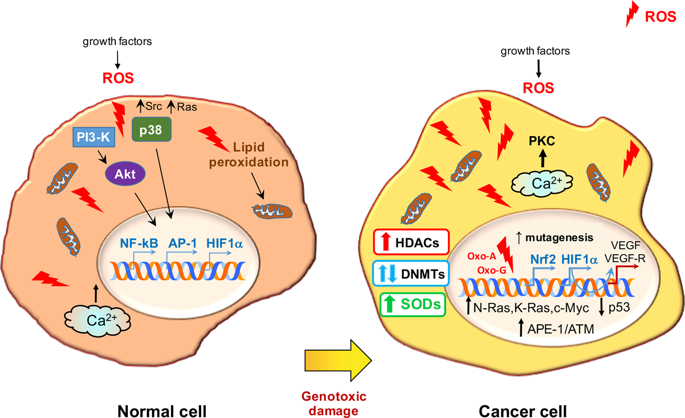当前位置:
X-MOL 学术
›
Exp. Mol. Med.
›
论文详情
Our official English website, www.x-mol.net, welcomes your feedback! (Note: you will need to create a separate account there.)
ROS in cancer therapy: the bright side of the moon.
Experimental & Molecular Medicine ( IF 12.8 ) Pub Date : 2020-02-14 , DOI: 10.1038/s12276-020-0384-2 Bruno Perillo 1, 2 , Marzia Di Donato 3 , Antonio Pezone 4 , Erika Di Zazzo 3 , Pia Giovannelli 3 , Giovanni Galasso 3 , Gabriella Castoria 3 , Antimo Migliaccio 3
Experimental & Molecular Medicine ( IF 12.8 ) Pub Date : 2020-02-14 , DOI: 10.1038/s12276-020-0384-2 Bruno Perillo 1, 2 , Marzia Di Donato 3 , Antonio Pezone 4 , Erika Di Zazzo 3 , Pia Giovannelli 3 , Giovanni Galasso 3 , Gabriella Castoria 3 , Antimo Migliaccio 3
Affiliation

|
Reactive oxygen species (ROS) constitute a group of highly reactive molecules that have evolved as regulators of important signaling pathways. It is now well accepted that moderate levels of ROS are required for several cellular functions, including gene expression. The production of ROS is elevated in tumor cells as a consequence of increased metabolic rate, gene mutation and relative hypoxia, and excess ROS are quenched by increased antioxidant enzymatic and nonenzymatic pathways in the same cells. Moderate increases of ROS contribute to several pathologic conditions, among which are tumor promotion and progression, as they are involved in different signaling pathways and induce DNA mutation. However, ROS are also able to trigger programmed cell death (PCD). Our review will emphasize the molecular mechanisms useful for the development of therapeutic strategies that are based on modulating ROS levels to treat cancer. Specifically, we will report on the growing data that highlight the role of ROS generated by different metabolic pathways as Trojan horses to eliminate cancer cells.
中文翻译:

ROS在癌症治疗中的作用:月亮的光明面。
活性氧(ROS)构成了一组高反应性分子,已演变为重要信号传导途径的调节剂。现在已被公认,中等水平的ROS需要几种细胞功能,包括基因表达。由于代谢率增加,基因突变和相对缺氧,导致肿瘤细胞中ROS的产生增加,过量的ROS被同一细胞中抗氧化剂酶和非酶途径的增加而猝灭。ROS的适度增加导致多种病理状况,其中包括肿瘤的促进和进展,因为它们参与不同的信号传导途径并诱导DNA突变。但是,ROS也能够触发程序性细胞死亡(PCD)。我们的综述将强调基于调节ROS水平以治疗癌症的治疗策略开发中有用的分子机制。具体而言,我们将报告不断增长的数据,这些数据强调了不同代谢途径产生的ROS作为特洛伊木马消除癌细胞的作用。
更新日期:2020-02-14
中文翻译:

ROS在癌症治疗中的作用:月亮的光明面。
活性氧(ROS)构成了一组高反应性分子,已演变为重要信号传导途径的调节剂。现在已被公认,中等水平的ROS需要几种细胞功能,包括基因表达。由于代谢率增加,基因突变和相对缺氧,导致肿瘤细胞中ROS的产生增加,过量的ROS被同一细胞中抗氧化剂酶和非酶途径的增加而猝灭。ROS的适度增加导致多种病理状况,其中包括肿瘤的促进和进展,因为它们参与不同的信号传导途径并诱导DNA突变。但是,ROS也能够触发程序性细胞死亡(PCD)。我们的综述将强调基于调节ROS水平以治疗癌症的治疗策略开发中有用的分子机制。具体而言,我们将报告不断增长的数据,这些数据强调了不同代谢途径产生的ROS作为特洛伊木马消除癌细胞的作用。


























 京公网安备 11010802027423号
京公网安备 11010802027423号